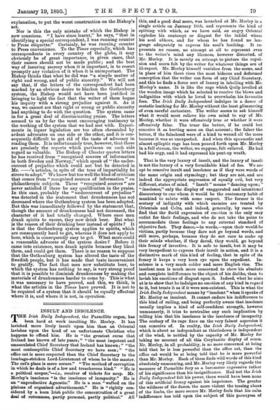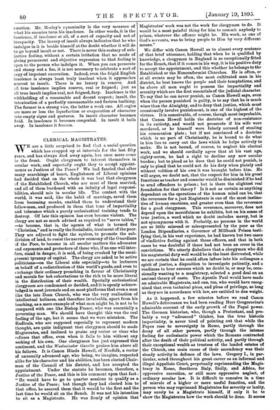INSULT AND INSOLENCE.
THE Irish Daily Independent, the Parnellite organ, has been hard at work insulting Mr. Morley. It has lavished more lively insult upon him than an Oriental lavishes upon the head of an unfortunate Christian who happens to offend him. He is "the greatest curse that Ireland has known of late years ; " "the most impotent and emasculated Chief Secretary that Ireland has known;" "the most contemptible Chief Secretary we have seen ; " "the office cat is more respected than the Chief Secretary to the lumbago-stricken Lord-Lieutenant of whom he is the master. The cat's place is more secure." "The method of corruption in which he deals is of a low and treacherous kind." "He is a political souper,"--i.e., receiver of tickets for soup. Mr. Morley's insolence "is the insolence of incapacity." He is an "unproductive Agnostic." He is a man "wafted on the pinions of organised advertisement" He is "rightly con- sidered by a keen Irish public the concentration of a great deal of rottenness, partly personal, partly political." All
this, and a good deal more, was launched at Mr. Morley in a single article on January 10th, and represents the kind of spitting with which, as we have said, an angry Oriental explodes his contempt or disgust for the infidel whom his soul abhors, and for whom he has found no lan- guage adequately to express his soul's loathing. It re- presents no reason, no attempt at all to represent even to the writer's mind any likeness, however distorted, of Mr. Morley. It is merely an attempt to picture the repul- sion and scorn felt by the writer for whatever things are of ill-report. Mr. Morley himself vanishes from the scene, and in place of him there rises the most hideous and deformed conception that the writer can form of any Chief Secretary, and this he finds a fierce sort of luxury in labelling with Mr. Morley's name. It is like the rage which Quilp levelled at the wooden image which he selected to receive the blows and indignities with which he loved to overwhelm his favourite foes. The Irish Daily Independent indulges in a dance of ecstatic loathing for Mr. Morley without the least glimmering of even careful caricature. The writer seems to ask himself what it would most relieve his own mind to say of Mr. Morley, whether it were offensively true or whether it were offensively false. The truer the better, if he could but conceive it as hurting more on that account ; the falser the better, if the falsehood were of a kind to wound all the more because it was so unexpected. And when this spasmodic and almost epileptic rage has been poured forth upon Mr. Morley in a full stream, the writer, we suppose, felt relieved. He had had his orgy, and it had expressed his pent-up wrath.
That is the very luxury of insult, and the luxury of insult is not the luxury of a very formidable kind of foe. We are apt to conceive insult and insolence as if they were words of the same origin and etymology ; but they are not, and are indeed the appropriate expression of equally evil, but very different, states of mind. " Insult " means "dancing upon;" "insolence," only the display of exaggerated and intentional discourtesy to one whom it would be the customary habit of mankind to salute with some respect. The former is the ecstasy of indignity with which enemies are treated by Orientals and Celts, and indeed, generally, by races who find that the florid expression of emotion is the only easy outlet for their feelings, and who do not take the pains to accommodate those feelings to any external standard of objective fact. They dance,—in words,—upon their would-be victims, partly because they dare not go beyond words, and still more, perhaps, because they do not care to make up their minds whether, if they dared, they would, go beyond this frenzy of invective. • It is safe to insult, but it may be very inexpedient to express their insult in action, and it is a distinctive mark of this kind of feeling, that in spite of its frenzy it keeps a very keen eye upon the expedient. In- solence is a very much colder and more English vice. The insolent man is much more concerned to show his absolute and complete indifference to the object of his dislike, than to lavish his emotions of disgust upon it. Indeed, what he aims at is to show that he indulges no emotion of any kind in regard to it, but treats it as if it were non-existent. This is what the Irish Daily Independent means by "insolent " when it speaks of Mr. Morley as insolent. It cannot endure his indifference to this kind of railing, and being perfectly aware that insolence usually implies a kind of self-confident strength, however unmannerly, it tries to neutralise any such implication by telling him that his insolence is the insolence of incapacity. The ecstasy of its rage fixes on the very falsest aspersion it can conceive of. In reality, the Irish Daily Independent, which is about as independent as thistledown is independent of the wind, is nettled by the capacity of Mr. Morley for taking no account of all this Corybantic display of scorn. Mr. Morley, in all probability, is no more concerned at being told that he is less powerful than the office cat, than the office cat would be at being told that he is more powerful than Mr. Morley. Each of them finds wild words of this kind absolutely unmeaning, and Mr. Morley very likely regards the measure of Parnellite fury as a barometer expressive rather of his significance than his insignificance. Had not the Irish Daily Independent felt his power, there would have been none of this artificial frenzy against his impotence. The greater the wildness of the dance, the more violent the tossing about of the limbs, the more secure Mr. Morley feels that his calm indifference has told upon the subject of this paroxysm of
emotion. Mr. Morley's equanimity is the very measure of what his enemies term his insolence. In other words, it is the insolence, if insolence at all, of a sort of capacity and not of incapacity. The luxury of insult always indicates that he who indulges in it is beside himself at the doubt whether it will do to go beyond insult or not. There is never this ecstacy of sub- jective feeling, without a certain irritation that no mode of giving permanent and objective expression to that feeling is open to the person who indulges it. When you can persecute and stamp out a foe, it is not necessary to celebrate a sort of orgy of impotent execration. Indeed, even the frigid English insolence is always least truly insolent when it approaches nearest to insult. There is no luxury in reserve. And 111 time insolence implies reserve, real or feigned; just as all true insult implies real, not feigned, fury. Insolence is the withholding of a reasonable and decent respect; insult, the intoxication of a perfectly unreasonable and furious loathing. The former is a strong vice, the latter a weak one. All orgies are more or less the liquefaction or evaporation of character into empty signs and gestures. In insult character becomes (laid. In insolence it becomes congealed. In insult it boils away. In insolence it freezes.



































 Previous page
Previous page